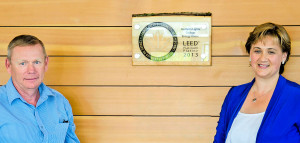Energy House achieves LEED® Platinum certification
DAWSON CREEK – The Centre of Excellence for Clean Energy Technology (Energy House) at the Dawson Creek Campus of Northern Lights College has achieved LEED® Platinum certification by the Canada Green Building Council. With the certification, Energy House becomes one of only a few dozen LEED Platinum buildings in the New Construction and Major Renovation category in Canada. According to the certification review report that was completed in June by the Canada Green Building Council, NLC achieved 56 points in the Leadership in Energy and Environmental Design (LEED®) Canada Rating Systems. The minimum to achieve Platinum status is 52 points. Platinum is the highest level of achievement. LEED defines six categories that are evaluated during the assessment process. There are five Environmental categories – Sustainable Sites, Water Efficiency, Energy and Atmosphere, Materials and Resources, and Indoor Environmental Quality – and a category for Innovation and Design Process. The five environmental categories are divided into LEED credits, subject to meeting certain performance goals. As well, a number of mandatory prerequisites must be achieved. “Receiving LEED Platinum certification for Energy House is a very proud achievement for Northern Lights College. Earning Platinum status involved the hard work of dozens of people at the College to create and execute the plan to build Energy House,” said NLC’s regional facilities manager, Murray Armstrong. “However, Platinum status is more than just building a good structure. It also involves changes and shifts to cultural norms around the College, such as having smoking areas a minimum 7.5 metres away from entrances, windows or air intakes, and includes such things as having designated carpool parking spots.”
Some of the notable features of Energy House, and its construction process, that contributed to the LEED Platinum certification include:
· Half of the site area was restored with native or adaptive vegetation, and does not require irrigation
· Automatic controls have been installed for non-emergency interior lighting
· Wastewater generated by the building has been reduced by 92 per cent
· No CFCs or HCFCs were used in the building
· Recyclables are collected and stored
· 91 per cent of construction waste was diverted from landfill
· 12.5 per cent of materials were manufactured and extracted regionally
· A permanent carbon dioxide monitoring system has been installed in the building
· Low-emitting materials were used in the construction process including adhesives and sealants, composite wood and laminate adhesives, and carpets
· And all regularly occupied areas are day-lit.

A photo of Energy House at the Dawson Creek Campus of Northern Lights College. LEED-plaque: Murray Armstrong, regional facilities manager, and Laurie Rancourt, president of NLC, with the plaque recognizing LEED® Platinum certification by the Canada Green Building Council.

 Follow
Follow



Recent Comments